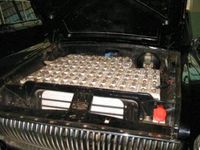Lithium Technology Corporation Powers US Hybrid Electric Vehicle Project
PLYMOUTH MEETING, Pa.--Lithium Technology Corporation ("LTC") (OTC: LTHU), a global provider of large lithium-ion rechargeable power solutions, is powering the Chevy Equinox being re-engineered by the University of California, Davis Hybrid Electric Vehicle Group as part of the Challenge X: Crossover to Sustainable Mobility engineering competition. LTC provided a series of high power lithium-ion cells to power the University’s demonstration vehicle entry for the contest sponsored by General Motors (GM) and the U.S. Department of Energy (DOE).
LTC delivered 95 cells used by the UC Davis team to build the battery for the converted plug-in hybrid electric vehicle (PHEV). Each cell has an output of 3.6 V (nominally) and a capacity of 45 Ah. The nominal battery pack voltage is 342 V, and with each cell limited to 4.2V, the maximum pack voltage is approximately 400 V. The converted Chevy Equinox is a plug-in hybrid electric vehicle (PHEV). This means that the battery can be charged by either a generator driven by the internal combustion engine (ICE) or a standard AC household electrical socket. The PHEV can drive over 40 miles on the overnight electrical charge and has a fuel economy of 36 mpg in the city, and 38 mpg on the highway in hybrid mode, as compared to the original range of 19 mpg city and 25 mpg highway. This is an improvement which reflects a reduction of approximately 68% in city and 39% for highway fuel consumption and release of pollutants.
“LTC is commited to continuously advancing automotive battery solutions, and we are proud to be associated with this project, which illustrates that the technology to make a difference is available today,” comments Dr. Klaus Brandt, executive vice president of LTC and managing director of GAIA. “Lithium-ion batteries are the technology of choice for hybrid and electrical vehicles offering improved performance and cost advantages over conventional technologies.”
LTC’s cells and the UC Davis project were recently highlighted in a video produced by Plug-In Partners, a national grass-roots organization consisting of numerous state and local government offices, research and academic institutions and diverse businesses that have collaborated to demonstrate to automakers that a market for flexible-fuel PHEVs exists today. The full video discussing the economic and environmental benefits of PHEVs can be viewed on the Plug-In Partners website at http://www.pluginpartners.org/includes/images/PHEV%20Video%2010%20Best .wmv . (Due to its length, this URL may need to be copied/pasted into your Internet browser's address field. Remove the extra space if one exists.)
Andrew Frank, the UC Davis team adviser and professor of Mechanical Engineering at the University discusses how LTC’s technology was integrated into the group’s vehicle and the advantages of lithium-ion. “The battery from the old car is metal hydride, it’s still good but it’s older technology…the new lithium battery has the same capacity as the old battery but is much smaller and half the weight,” comments Prof. Frank.



